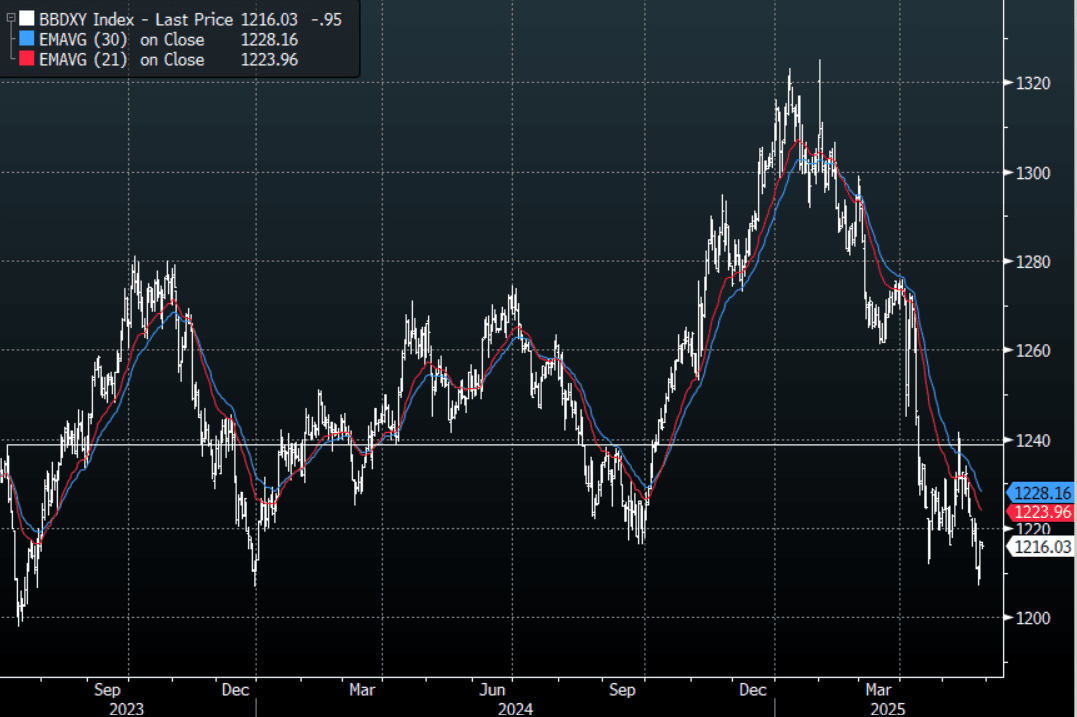USD: Gets A Reprieve
The BBDXY range overnight was 1210.51 - 1217.09, Asia is currently trading around 1215. The USD has opened a little lower in early trading in Asia, but had a strong bounce overnight as some overextended short positions in the USD and Long-end global bonds were pared back.
- Bloomberg - “The dollar is higher in New York trading, buoyed by an overnight Treasury rally that helped push the long-end of the Treasury curve back below 5%. While the dollar reprieve is refreshing given the overwhelmingly bearish tilt of the market – it’s unlikely to last.”
- “With long bonds entering a structural bear market, it will take more than just one session of gains for the tide to turn for Treasuries and the dollar. One day most certainly does not make a trend, and dollar selling is likely to resume as we await further clarity on trade and the US fiscal situation.”
- There is a broad consensus that the USD is set to embark on a decent move lower as the world reduces its exposure to the US and repatriates a lot of these flows.
- Corporate month end is over the next day or 2 and with it the normal demand for USD’s, this could provide better levels to fade back towards 1225/30 again.
Data/Events : Wednesday's calendar includes more regional Fed surveys (Richmond services/manufacturing, Dallas services) and an appearance by FOMC's Kashkari, with supply including 2Y FRN and 5Y Note. We then get the minutes of the May FOMC meeting in the afternoon. The Nvidia results will also be closely watched.
Fig 1: BBDXY Daily Chart

Source: MNI - Market News/Bloomberg
Want to read more?
Find more articles and bullets on these widgets:
Historical bullets
JGBS: Little Changed, Holiday Tomorrow, BoJ Policy Decision On Thursday
In Tokyo morning trade, JGB futures are slightly stronger, +6 compared to settlement levels.
- With the domestic calendar empty ahead of tomorrow's holiday and Thursday's BoJ Policy Decision, the local market is on headlines and US tsys watch.
- (MNI) The Bank of Japan board is expected to keep its 0.5% policy interest rate unchanged at the two-day meeting ending May 1, as policymakers monitor the economic and inflationary impact of recent U.S. trade policies and volatile markets.
- Bank economists will also assess the potential downside risks to the economy and how they might affect inflation, using the most recent data available ahead of the meeting. This analysis will help shape the most likely economic scenario and inform the quarterly Outlook Report forecasts published alongside the rate decision.
- Cash US tsys are 1-2bps cheaper, with a flattening bias, in today’s Asia-Pac session after Friday’s solid gains.
- Cash JGBs are flat to 1bp richer out to the 30-year across benchmarks and ~1bp cheaper beyond. The benchmark 10-year yield is 1.1bps lower at 1.331% versus the cycle high of 1.596%.
- Swap rates are little changed. Swap spreads are mixed.
US TSY FLOWS: Block - SELL TYM5
SELL 3020 of TYM5 traded at 111-19+, post-time 01:36:55 BST (DV01 $193,162). The contract is currently trading at 111-18+, 0-02+ from closing levels.
JPY: Goldman Sachs Sees Downside USD/JPY Risks, Likes Short AUD/JPY
Goldman Sachs: "JPY: Protection selection. Being long the Japanese Yen versus the Dollar—or short USD/JPY—tends to be one of the most effective FX hedges against recession fears. But price action over the past month exhibits both its benefits and limits as a risk hedge. USD/JPY did generally move lower across recent key periods, though it “failed to work” in late March around the auto tariffs announcement. A backdrop of higher yields tends to be the one case in which USD/JPY moves higher even alongside lower equities, as was the case last month. But the regime of shifting correlations since then and the perception of greater institutional risks leaves rates a less obvious headwind, at least until those concerns relax. We also continue to think that any dovish shift from the BoJ next week would not be a barrier to Yen strength. Our view that the Dollar should unwind its overvaluation of recent years—with high probability that it flips to undervalued on a broad basis—means that USD/JPY should be an effective hedge over time. We see USD/JPY falling to 135 over the next 12 months, with risks skewed towards getting to (and below) that level much earlier. But given that equities still look vulnerable to nearer-term downside and the speed of the Dollar sell-off leaves it susceptible to shorter-term swings, we prefer to be short AUD/JPY tactically. The main risk to this expression is that policy continues to shift in a market-friendly direction, or that the hard data remain resilient in the upcoming key data releases. Though while front-loading ahead of tariffs may mask any weakness in activity, we expect markets to continue to discount better data over the very near term."